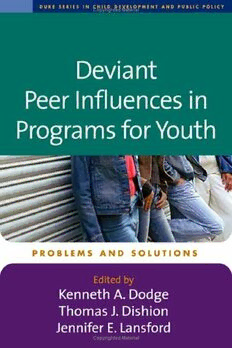
Deviant Peer Influences in Programs for Youth: Problems and Solutions (The Duke Series in Child Develpment and Public Policy) PDF
475 Pages·2006·1.663 MB·English
Most books are stored in the elastic cloud where traffic is expensive. For this reason, we have a limit on daily download.
Preview Deviant Peer Influences in Programs for Youth: Problems and Solutions (The Duke Series in Child Develpment and Public Policy)
Description:
Most interventions for at-risk youth are group based. Yet, research indicates that young people often learn to become deviant by interacting with deviant peers. In this important volume, leading intervention and prevention experts from psychology, education, criminology, and related fields analyze how, and to what extent, programs that aggregate deviant youth actually promote problem behavior. A wealth of evidence is reviewed on deviant peer influences in such settings as therapy groups, alternative schools, boot camps, group homes, and juvenile justice facilities. Specific suggestions are offered for improving existing services, and promising alternative approaches are explored.
See more
The list of books you might like
Most books are stored in the elastic cloud where traffic is expensive. For this reason, we have a limit on daily download.
